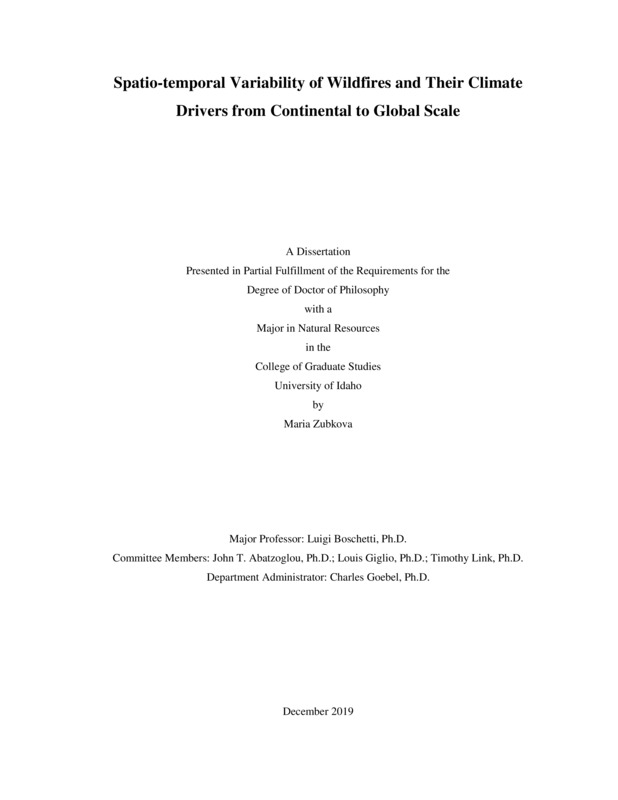Spatio-temporal Variability of Wildfires and Their Climate Drivers from Continental to Global Scale
Zubkova, Maria. (2019-11). Spatio-temporal Variability of Wildfires and Their Climate Drivers from Continental to Global Scale. Theses and Dissertations Collection, University of Idaho Library Digital Collections. https://www.lib.uidaho.edu/digital/etd/items/zubkova_idaho_0089e_11744.html
- Title:
- Spatio-temporal Variability of Wildfires and Their Climate Drivers from Continental to Global Scale
- Author:
- Zubkova, Maria
- ORCID:
- 0000-0001-7075-6936
- Date:
- 2019-11
- Embargo Remove Date:
- 2021-07-02
- Keywords:
- climate fire regimes global analysis
- Program:
- Natural Resources
- Subject Category:
- Environmental science
- Abstract:
-
Fire is a natural component of most ecosystems, and it has effects on vegetation, soil, water, atmospheric composition, and human well-being. Despite increasing interest in interdisciplinary approaches to analyzing global fire activity and the growing body of wildfire research, there are still many gaps and uncertainties in our knowledge. Some come from the lack of understanding of the complex relationships between fire and climate, which is additionally entangled by the strong influence of human activity.
This dissertation evaluates the role of environmental context in determining the spatial patterns of fire activity on a large scale. First, the fire-climate relationship was analyzed in terms of the most studied and understood fire metric – the amount of burned area – which was shown to have changed significantly in the last two decades. Most of the recent changes were attributed to the decrease in fire activity in Africa, where the amount of burned area declined by 18.5% between 2002 and 2016. Although humans have a long history of modifying fire activity in Africa, climate factors directly related to biomass productivity and aridity explained about 70% of the changes in burned area in natural land covers, providing evidence that increased terrestrial moisture during 2002-2016 facilitated declines in fire activity in Africa. These results illustrate the strong influence of climate on fire activity and in particular proxy for fuel productivity and fuel dryness.
Based on these findings, a framework was proposed for defining and classifying fire regimes (a range of characteristics that describe the fire events in the space-time window). This framework was based on the assumption that fuel productivity and desiccation are the two fundamental processes that limit fire activity, and their combination sets important boundary conditions for key fire regime metrics on a large scale. By testing this approach in Africa and Australia, it was evident that while the amount of rainfall is an important driver of fire through controlling fuel productivity, a variation of rainfall within and between years drives fuel dryness and fire activity especially in Australia, a continent with a strong precipitation gradient. Additionally, among continents, fire metrics vary substantially even within the same biome.
These results informed an additional global analysis, where 26 distinct fire regions were identified, not including areas where fire activity is highly modified by human activity. This approach did not only discriminate between regions with significantly different fire activity across a number of biomes but also identified how fire attributes vary under different conditions and what factors constrain modern fire regimes. These findings should help to improve our understanding of fire complexity and its interaction and feedbacks with climate which is essential to assess the potential effect of global climate change on fire regimes.
- Description:
- doctoral, Ph.D., Natural Resources -- University of Idaho - College of Graduate Studies, 2019-11
- Major Professor:
- Boschetti, Luigi
- Committee:
- Abatzoglou, John T.; Giglio, Louis ; Link, Timothy
- Defense Date:
- 2019-11
- Identifier:
- Zubkova_idaho_0089E_11744
- Type:
- Text
- Format Original:
- Format:
- application/pdf
- Rights:
- In Copyright - Educational Use Permitted. For more information, please contact University of Idaho Library Special Collections and Archives Department at libspec@uidaho.edu.
- Standardized Rights:
- http://rightsstatements.org/vocab/InC-EDU/1.0/

